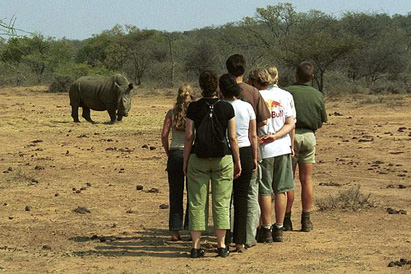

 The Accurate Reloading Forums
The Accurate Reloading Forums  THE ACCURATE RELOADING.COM FORUMS
THE ACCURATE RELOADING.COM FORUMS  Nature, Animals, Space And The Sea
Nature, Animals, Space And The Sea  Game Management
Game Management  Pecking order in bachelor herds?
Pecking order in bachelor herds?Go  | New  | Find  | Notify  | Tools  | Reply  |  |
| one of us |
Not sure if this is the best place to ask, but as it is not a question about African hunting, but just the behavior of African game animals, I’ll try here first. Here at least some professional wildlife biologists will maybe read and comment..... Many game species – certainly some African species - have a typical population structure of: (i) The ‘Breeding Herd’ of females and sexually immature males and one Dominant Herd Male – a position of honor and very much fought for. (ii) Territorial males that fight for and defend territories. (iii) The ‘Batchelor Herd’ when most males that have just reached sexual maturity go. My question is really about the behavior of those animals in the bachelor herd: Do they have a ‘pecking order’, or social hierarchy within such a herd? Or is the bachelor herd just a place where youngsters, and older guys hurt or weakened by former fighting, grow strong and big or healthy enough to contend for territory or challenge the herd male? Any insight offered? In good hunting. Andrew McLaren | ||
|
| One of Us |
I'm certainly not a wildlife biologist, so these are just my observations. Take 'em or leave 'em. Because of the constant sparring, I imagine that, over time, a pecking order develops naturally within a bachelor herd. I doubt that bulls (bucks) that once had their own breeding herd would be interested in or welcome amongst the young bucks. I look at the fights a little differently. A failed attempt at taking over a breeding herd wouldn't weaken the challenger - it would make him stronger. It may wear him out, and he may return to his bachelor buddies for awhile, but in the end, he will be both smarter and stronger as a result of the fight. Those are just my thoghts. I'd also be interested in what the academics say. | |||
|
| One of Us |
Andrew, IMO, there is seldom such a thing as "batchelor herds". Cape Buffalo, elephant, North American deer, caribou, etc., may usually, or perhaps just at certain times of year, have groups of males away from females, but seldom more than 6-10 individuals in a group, although I have seen groups of 15 or so Caribou bulls. Males of many species seem to prefer small groups. There is always a pecking order based on strength and attitude, but not usually seen unless these males are involved during breeding season. There's not a whole lot worth fighting your "Buds" over except sex. Survival of the batchelors is enhanced by having a buddy or three. Too large a group becomes a constant target of predators. I'm not a game biologist, and I know your time in Africa is considerably more than mine, so these are just my thoughts, FWIW. Steve "He wins the most, who honour saves. Success is not the test." Ryan "Those who vote decide nothing. Those who count the vote decide everything." Stalin Tanzania 06 Argentina08 Argentina Australia06 Argentina 07 Namibia Arnhemland10 Belize2011 Moz04 Moz 09 | |||
|
| one of us |
I'm not a fundi either but from my observations, I'd say it depends on the species. Impala for example seem to form batchelor herds every year and then break up..... there's ALWAYS a lot going on in any impala herd if people just take the time and trouble to watch them and to me all that interrelationship that's going on must be to establish something..... and I'd guess it's partly sparring and pecking order. Whether it is or whether it isn't, I always get a lot of pleasure out of just sitting and watching impala to try and work out quite what's going on. | |||
|
| Powered by Social Strata |
| Please Wait. Your request is being processed... |
|
 The Accurate Reloading Forums
The Accurate Reloading Forums  THE ACCURATE RELOADING.COM FORUMS
THE ACCURATE RELOADING.COM FORUMS  Nature, Animals, Space And The Sea
Nature, Animals, Space And The Sea  Game Management
Game Management  Pecking order in bachelor herds?
Pecking order in bachelor herds?

Visit our on-line store for AR Memorabilia

